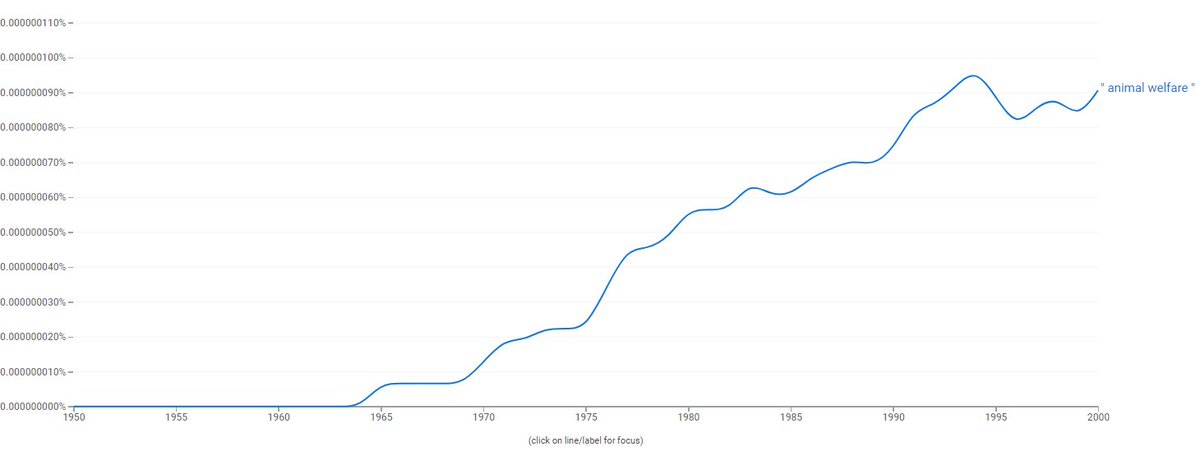
A few thoughts about 'animal welfare' as a discourse. In the past my view was that, as a discourse, 'animal welfare' was historically a welcome departure from the earlier language of 'anti-cruelty'. THREAD
The reason I thought this was because 'anti-cruelty' discourse is often associated with the 'indirect duty' view that harming animals is only wrong in so far as it also harms humans (e.g. moral corruption etc.). Animal welfare, by contrast seems more directly animal focused.
Now, however, I am not so sure. Animal welfare discourse emerged in Britain in the 1960s, shortly after the publication of Ruth Harrison's 'Animal Machines' in 1964. This book exposed the institutional cruelty of industrial animal farming to the general public.
Harrison observed: 'if one person is unkind to an animal it is considered to be cruelty, but where a lot of people are unkind to animals, especially in the name of commerce, the cruelty is condoned'. She argued that existing cruelty laws should be enforced consistently.
Prior to Harrison's book, concern about the treatment of animals was expressed largely in terms of 'cruelty' and 'unnecessary suffering'. After 1964 a new discourse of animal welfare emerged amidst public concerns about intensive farming. See pubmed.ncbi.nlm.nih.gov/22192762/
The government responded to public concern by appointing a ‘technical committee to enquire into the welfare of animals kept under intensive livestock husbandry systems’. Check out how usage of 'animal welfare' skyrocketed after 1964: 

Why did 'animal welfare' take hold as a concept? There are of course multiple explanations. One might be that issues like veterinary care and adequate accommodation for farm animals mirrored the housing and health objectives of the still fairly new post-war 'welfare state'.
A more cynical explanation might be that 'animal welfare' was deployed to sanitise practices occurring on an industrial scale on farms that would constitute criminal offences were they happening to pets in people's homes.
Whatever the reasons for the emergence of animal welfare discourse, its effect in public policy, law and science has been to bifurcate our moral vocabulary. We tend to talk 'cruelty' with regard to individual conduct, but 'welfare' wrt institutional practices affecting animals.
What effect does this bifurcation have on our ability to discuss the treatment of farm animals? While there are many benefits to welfare discourse, there are disadvantages too. Uncritical recourse to welfare talk can, in my view, lead to animal advocates walking into a trap...
Let me give some contrasts between 'cruelty' and 'welfare' discourse and then show how the latter is less good than the former at capturing much of what is wrong with how we treat animals in institutional settings.
First, on the one hand, cruelty is a binary concept. An act or practice is either cruel or not cruel. By contrast 'welfare' is a scalar notion, there are 'higher' and 'lower' states of welfare and policies and practices 'improve' or 'undermine' welfare to various degrees.
Second, 'cruelty' inherently implies a wrong or an injustice. By contrast, 'welfare', although an evaluative term, is not inherently moral. Indeed, it is often (incorrectly) thought of as a neutral, technical, scientific concept.
Third, following from the previous point, cruelty discourse draws attention to a perpetrator whereas welfare discourse merely describes a state of affairs.
Now, consider the following two sentences:
'kicking a dog is cruel'
'kicking a dog causes that dog to experience a detrimental impact to their welfare'
Which better captures what you'd want to say?
'kicking a dog is cruel'
'kicking a dog causes that dog to experience a detrimental impact to their welfare'
Which better captures what you'd want to say?
Now, of course, the two are not mutually exclusive. The reason it's cruel to kick a dog might be because harms the dog's welfare, but welfare discourse alone doesn't capture that. It's scalar, morally neutral and state-of-affairs-focused nature can't do all the moral leg work
The same problem arises in relation to animal farming:
'Debeaking a chicken with no anesthetic is cruel'
'Debeaking a chicken with no anesthetic has adverse welfare detriments for the chicken'
'Debeaking a chicken with no anesthetic is cruel'
'Debeaking a chicken with no anesthetic has adverse welfare detriments for the chicken'
In short, the crowding out of 'cruelty' discourse by 'welfare' in the context of institutional animal exploitation has had considerable downsides. It arbitrarily bifurcates how we talk about individual and institutional violence against animals.
It neutralises injustice. It side-lines empathy. It encourages distance. It treats animals as the objects of impartial observation rather than victims in need of protection and care.
I say this not to dismiss the importance of animal welfare discourse, but rather to lament its over-extension (especially in the fields of law and policy) and its crowding out of important alternative discourses, including cruelty discourse.
Going forward, rights discourse has so much to add to the legal protection of animals. It addresses much of what the welfare and anti-cruelty discourses cannot do by themselves.
• • •
Missing some Tweet in this thread? You can try to
force a refresh



